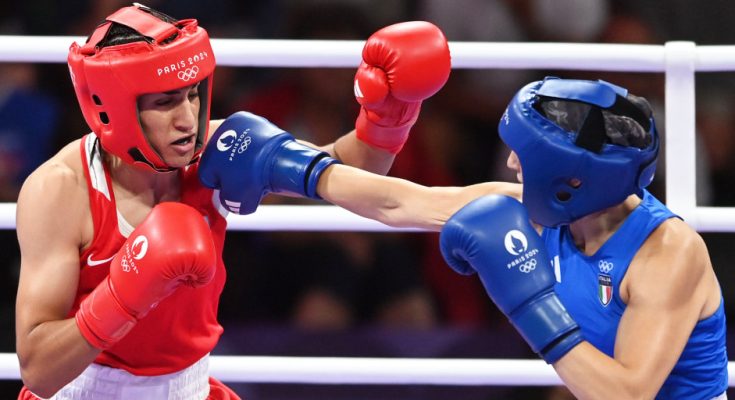Two boxers are now under scrutiny after being barred from previous competitions.
Algerian boxer Imane Khelif won her first match at the Paris Olympics this week. But her victory has come under scrutiny after viewers learned that she and another boxer, Lin Yu-ting of Taiwan, were disqualified last year from a competition outside the Olympics.
On Thursday, Aug. 1, 2024, Khelif defeated Italian boxer Angela Carini in a fight that lasted just 46 seconds, NBC News reports.
Following that bout, reports resurfaced that Khelif and Yu-ting were disqualified from the Women’s World Boxing Championships last year in New Delhi after failing to meet gender eligibility tests.
Both were barred from competing after unspecified tests suggested they had male chromosomes, a decision the International Olympic Committee called “sudden and arbitrary” in a statement released on Thursday. In its statement, the IOC strongly reaffirmed that the two athletes were eligible to compete in Paris.
Did a male boxer beat a woman at the Olympics?
No. Despite the controversy swirling online, Khelif has always competed as a woman. And there’s no indication that Khelif is intersex or transgender, NBC News reports.
And in its statement, the IOC made it clear the boxers met all the rules necessary to compete at the 2024 Olympic Games. The statement also calls recent reports questioning the boxers’ genders “misleading information about two female athletes” and states that the two have competed in the women’s category for many years.
“The Algerian boxer was born female, was registered female, lived her life as a female, boxed as a female, has a female passport,” said Mark Adams, chief spokesperson for the IOC, at a news conference Friday, Aug. 2, per the Associated Press.
“This is not a transgender case,” he continued. “There has been some confusion that somehow it’s a man fighting a woman. This is just not the case, scientifically.”
@apnews The International Olympics Committee said Friday that Algerian boxer Imane Khelif was born a woman and eligible to compete in her fight against Italy’s Angela Carini. The IOC’s daily press conference had many questions on Khelif, who has landed in the middle of a culture war about gender in sports after Carini quit Thursday’s fight under a minute into the bout. #Olympics #Paris2024 #Boxing ♬ original sound – The Associated Press
He emphasized that the athletes are also not transgender, adding, “The question you have to ask yourself is, are these athletes women? The answer is yes, according to their eligibility, their passport, their history.”
In 2021, the IOC updated its gender eligibility guidelines, including the participation of transgender athletes, to defer to each sport’s governing body. But when it comes to boxing, the IOC no longer defers to the International Boxing Association.
Last year, the IOC withdrew its recognition of the IBA following a host of governmental transparency issues, including concerns over instances of corruption, as NBC News explains. Instead, the IOC is following the guidelines of the ad-hoc Paris 2024 Boxing Unit.
“All athletes participating in the boxing tournament of the Olympic Games Paris 2024 comply with the competition’s eligibility and entry regulations, as well as all applicable medical regulations set by the Paris 2024 Boxing Unit,” the IOC statement reads.
Age and gender information for boxers competing in the Paris Olympics is taken from their passports, as has been the case in previous Olympic boxing competitions, according to the statement.
The IOC statement also notes that the “two athletes have been competing in international boxing competitions for many years in the women’s category, including the Olympic Games Tokyo 2020, International Boxing Association (IBA) World Championships and IBA-sanctioned tournaments.”
Why were Imane Khelif and Lin Yu-ting disqualified from previous boxing competitions?
The two athletes were disqualified from the Women’s World Boxing Championships last year after Umar Kremlev, president of the IBA, alleged that test results showed they carried male chromosomes.
“Based on DNA tests, we identified a number of athletes who tried to trick their colleagues into posing as women,” Kremlev, who is Russian, told Russian news agency Tass at the time, per NBC News.
Russia has no teams competing in the 2024 Olympics, as it’s been banned. Some Russians are competing individually, but none are boxers.
“According to the results of the tests, it was proved that they have XY chromosomes. Such athletes were excluded from competition,” Kremlev said. (While males carry XY chromosomes, females carry XX chromosomes. And some intersex people carry XY chromosomes but present as female.)
He emphasized that the athletes are also not transgender, adding, “The question you have to ask yourself is, are these athletes women? The answer is yes, according to their eligibility, their passport, their history.”
In 2021, the IOC updated its gender eligibility guidelines, including the participation of transgender athletes, to defer to each sport’s governing body. But when it comes to boxing, the IOC no longer defers to the International Boxing Association.
Last year, the IOC withdrew its recognition of the IBA following a host of governmental transparency issues, including concerns over instances of corruption, as NBC News explains. Instead, the IOC is following the guidelines of the ad-hoc Paris 2024 Boxing Unit.
“All athletes participating in the boxing tournament of the Olympic Games Paris 2024 comply with the competition’s eligibility and entry regulations, as well as all applicable medical regulations set by the Paris 2024 Boxing Unit,” the IOC statement reads.
Age and gender information for boxers competing in the Paris Olympics is taken from their passports, as has been the case in previous Olympic boxing competitions, according to the statement.
The IOC statement also notes that the “two athletes have been competing in international boxing competitions for many years in the women’s category, including the Olympic Games Tokyo 2020, International Boxing Association (IBA) World Championships and IBA-sanctioned tournaments.”
In its statement this week, however, the IOC made it clear that it disagreed with the IBA’s conclusion — and denounced the treatment that Khelif and Yu-ting have received since.
“The current aggression against these two athletes is based entirely on this arbitrary decision, which was taken without any proper procedure — especially considering that these athletes had been competing in top-level competition for many years,” the IOC statement reads. “Such an approach is contrary to good governance.”
Khelif responded to her disqualification with allegations that some “did not want Algeria to win a gold medal.”
“This is a conspiracy and a big conspiracy, and we will not be silent about it,” she told Algeria’s Ennahar TV, per NBC News.
Why did Angela Carini walk out of her boxing match?
During the match, Khelif and Carini exchanged a few punches, and Carini abruptly withdrew from the fight after less than a minute. She appeared to be in tears and refused to shake Khelif’s hand following the bout, according to NBC News. Carini was also clearly seen touching her nose.
Afterward, Carini told reporters at the event that she ended the fight because had “severe pain” in her nose.
While celebrities and politicians have not stopped themselves from weighing in on the controversy, Carini expressed that the decision on whether or not Khelif should have been allowed to compete was not up to her.
“I am not here to judge or pass judgment,” Carini said, per NBC News. “If an athlete is this way, and in that sense it’s not right or it is right, it’s not up to me to decide.”
The next day, Aug. 2, Carini expressed her apologies to Khelif.
“My face and nose were hurting,” Carini told Italian sports outlet Gazzetta dello Sport. “I couldn’t breathe anymore. I thought about my family, I looked at my brother in the stands and I went to my corner to retire. … I’ve never been hit with such a powerful punch.”
“All this controversy makes me sad,” she continued. “I’m sorry for my opponent, too. … If the IOC said she can fight, I respect that decision.”
Carini also said she regretted not shaking Khelif’s hand after the match. “It wasn’t something I intended to do,” Carini said. “Actually, I want to apologize to her and everyone else. I was angry because my Olympics had gone up in smoke. I don’t have anything against Khelif. Actually, if I were to meet her again, I would embrace her.”
When are Imane Khelif and Lin Yu-ting scheduled to compete again?
Despite the increased scrutiny, Khelif is next set to go up against Hungary’s Luca Anna Hamori on Saturday, Aug. 3. And Yu-ting, who won her match Friday against Sitora Turdibekova of Uzbekistan, will next face Svetlana Staneva of Bulgaria on Sunday, Aug. 4.
Peacock is streaming the Paris Olympics around the clock. Learn more about accounts here. TODAY earns a commission on purchases. Peacock is owned by our parent company NBCUniversal.



